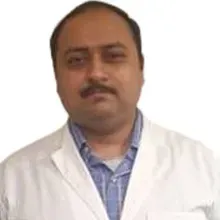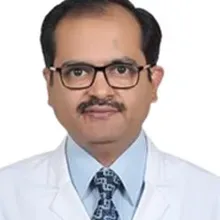About Doctor DR. DINESH SINGH
About
Dr. Dinesh Singh is an accomplished radiation oncologist with 32 years of expertise. His research interests include breast cancer, thoracic cancer, and brain
tumors. He is capable of doing Brachytherapy, Conformal Radiotherapy, Stereotactic Radiotherapy, Intensity Modulated Radiotherapy, and image-guided radiotherapy. He belongs to the INCTR, the Association of Radiation Oncologists of India, the Indian Society of Oncology, and the Indian Medical Association. He serves as the secretary of the Delhi branch of the Men's Health Society of India. For the past 25 years, Dr. Dinesh Singh has been in practice in the Delhi-National Capital Region. He has extensive expertise in brachytherapy, conformal radiation, stereotactic radiotherapy, intensity modulated radiotherapy, and image-guided radiotherapy. He has also raised awareness about contemporary radiation among doctors in Delhi and the National Capital Region.
Work Experience
32 years of experience
Dr. Dinesh Singh is a trained radiation oncologist who earned his MD in Radiotherapy from LNJP Hospital and MAMC College in 1991 and his MBBS from UCMS in 1986. For the past 32 years, Dr. Dinesh Singh has been in practice in the Delhi-National Capital Region. He specializes in brachytherapy, conformal radiation treatment, stereotactic radiotherapy, intensity-modulated radiotherapy, and image-guided radiotherapy. He has also raised knowledge of contemporary radiation practices among doctors in Delhi and NCR. Some of his professional experiences include:
-
Tata Memorial Hospital, Mumbai
-
Memorial Sloan Kettering Cancer Center, New York, USA
-
Ohio State University, Columbus, Ohio, USA
-
Long Beach Memorial Medical Center, Long Beach, California, USA
-
Stadt Kliniken Frankfurt University, Germany
Associated with Hospitals
List of Treatments
-
Chronic Lymphocytic Leukemia (CLL): In the case of chronic lymphocytic leukemia, an excessive number of lymphocytes are produced by the bone marrow. Leukemia can have an effect on red blood cells, white blood cells, and platelets. Fatigue and enlarged lymph nodes are two indicators of chronic lymphocytic leukemia.
-
IMRT: Conformal radiotherapy includes intensity-modulated radiation (IMRT). With conformal radiotherapy, the radiation beams are precisely shaped to fit the cancerous tissue. A linear accelerator (LINAC), a common radiation device, can be used for IMRT.
-
Tumors and Cysts: A cyst is a sac that can contain air, liquids, or other substances. Any portion of the body, including bones, organs, and soft tissues, can develop a cyst. However, Tumors are defined as any unwanted mass of cells or inflammation in the body. As compared to cysts, tumors are cancerous. Tumors and cysts are removed by surgery, often performed under highly observed conditions.
-
Oral Cancer Treatment: Oral cancers can form on the tongue, the tissue that covers the mouth and lips, beneath the tongue, at the base of the tongue, and in the neck area towards the back of the mouth. Treatment for oral cancer includes a combination of surgery, radiotherapy, or chemotherapy.
-
Giant Cell Tumor Treatment: Curettage is the most commonly utilized surgical treatment to treat giant cell tumors. Special devices are used to remove the tumor from the bone during curettage, after which a bone transplant is performed. The opening becomes filled with a bone transplant after curettage to strengthen the bone
-
Chemotherapy for solid Malignancies: Chemotherapy for solid malignancies is a treatment that uses drugs to destroy cancer cells. Because the chemicals affect the entire body, it can destroy cancer cells in the tumor as well as any cells that have broken out of it and traveled through the blood or lymph to another place
Melanoma Treatment: Disorders of the tumor cells are also known as melanoma. The primary therapy for melanoma is surgical removal of the original melanoma on the skin, known as excision. Most melanomas are discovered when they are less than 1.0 mm thick, and minimally invasive treatment is frequently all that is required.
Education and Training
-
MBBS, UCMS, 1986
-
MD, Radiotherapy, LNJP Hospital and MAMC college, 1991
-
Fellowship, Stadt Kliniken Frankfurt University, Germany
-
Fellowship, Long Beach Memorial Medical Center, Long Beach, California, USA
Trainings/Specializations
Registrations
Special interest
-
Image-guided radiotherapy
-
Intensity-Modulated Radiotherapy
-
Stereotactic Radiotherapy
-
Conformal Radiotherapy
-
Brachytherapy.
 Associated with hospitals
Associated with hospitals
Envisioning the goals & paving the path to success for the organization.
Book Appoinment
Similar Doctors In Ghaziabad
Envisioning the goals & paving the path to success for the organization.
















